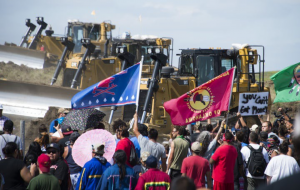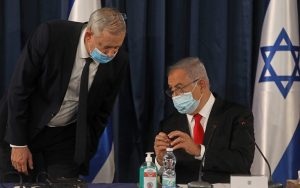In July, the Senate passed legislation to expand benefits for victims of nuclear testing. Now it’s up to the House of Representatives.
There are thousands of soldiers, all waiting nervously for the detonation of an aboveground nuclear explosion. As the countdown approaches zero, they are given a command: “Turn away, close your eyes, and cover your face with your arms.” The explosion begins. There is no noise at first, only a flash so bright that the soldiers see their own bones and blood vessels through their skin, as if they have x-ray vision.
This isn’t science fiction. From 1946-1962, more than half a million U.S. atomic veterans took part in hundreds of aboveground nuclear tests and, years later, the efforts to clean up testing sites. In September, I was lucky enough to attend a ceremony where, after a long legislative battle, a small group of atomic veterans received the first Atomic Veterans Commemorative Service Medals (AVCSM).
Background
For 16 years, the United States conducted more than 200 aboveground and underwater nuclear tests. During many of these tests, thousands of soldiers were stationed nearby, usually in trenches or on naval ships. Some were ordered to march toward ground zero shortly after the detonation. These experiences (documented in detail by Dutch filmmaker Morgan Knibbe in his documentary “The Atomic Soldiers”) left many veterans scarred; for the rest of their lives they remembered the mushroom clouds so clearly it was as if they had never vanished. Many suffered long-term illnesses likely related to their exposure to the tests. Even worse, the veterans were barred from telling anyone, including family members, about their experiences. This “secrecy oath” was only rescinded in 1996 and by then, many atomic veterans had already passed away, never able to tell their stories.
In 1963, as one of his lasts acts in office, President John F. Kennedy signed the Limited Test Ban Treaty (LTBT) with the United Kingdom and Soviet Union (and, later, more than 100 other countries). The LTBT, which is still in effect, prohibits explosive nuclear testing in the atmosphere, outer space, and under water. The LTBT is widely considered an historic victory in the campaign to reduce the global environmental damage and radiation releases caused by aboveground and underwater tests and, ultimately, a step towards ending these types of tests altogether.
A Fight for Recognition
For decades, atomic veterans have been fighting for recognition—and compensation—from leaders in Washington. In 1990, Congress passed the Radiation Exposure Compensation Act (RECA), which it expanded in 2000 to help cover the consequences associated with the aboveground tests. Under RECA, atomic veterans are eligible for a one-time payment of $75,000, but for some veterans, the process of securing that compensation was incredibly difficult. For those whose military records were destroyed during the National Personnel Records Center fire of 1973, it was even more challenging.
In addition, many atomic veterans have argued that $75,000 does not begin to cover the lasting damage likely caused by their participating in the nuclear tests or clean-up, especially if they faced illnesses. Many veterans also have fought for decades to receive a service medal in recognition of their sacrifices, but their repeated attempts to win recognition have failed year after year.
Earlier this year, however, 78 years after the first nuclear test in New Mexico and 77 years after the first series of nuclear tests involving active-duty soldiers, a group of atomic veterans finally received the Atomic Veterans Commemorative Service Medal—the culmination of a bipartisan push on Capitol Hill.
Broad Legacy of Nuclear Testing
Sadly, atomic veterans are not the only victims of explosive nuclear testing and the nuclear weapons lifecycle. The people who lived—and still live—near nuclear production facilities and nuclear test sites, the latter known as “downwinders,” also have been fighting for decades to be compensated for the lasting health issues and environmental degradation caused by the mining of nuclear materials and the development and testing of nuclear weapons.
While RECA provides a one-time payment of $50,000 to a select group of downwinders who lived near the Nevada Test Site (where the United States conducted a significant portion of its aboveground nuclear tests), thousands of other downwinders have remained ineligible for any compensation under RECA—including those who lived within miles of the first atomic explosion, “Trinity,” dramatized in the recent Christopher Nolan film, Oppenheimer.
However, this might be about to change. After years of tireless advocacy from downwinders, the Senate in July passed bipartisan legislation that included expanded RECA benefits for the New Mexico and Navajo Nation residents harmed by the Trinity test. The legislation still needs to pass the House and be signed by President Biden, and there are concerns that the specific RECA provisions could be weakened or removed before the final bill makes its way to president’s desk. Nonetheless, advocates are hopeful the provision will become law.
Resuming Nuclear Testing?
Unfortunately, even as veterans and downwinders fought to secure greater understanding and recognition of the impact of nuclear tests, in May 2020, The Washington Post reported that senior officials in the Trump administration discussed resuming (underground) explosive nuclear testing, which would reverse a moratorium on nuclear testing that dates back to the George H.W. Bush administration, more than three decades ago. Though these discussions never moved passed the theoretical stage, there is a serious risk that in the future there could be another push to resume explosive nuclear testing.
Just last week, President Putin signed a new law revoking Russia’s ratification of the Comprehensive Nuclear-Test-Ban Treaty (CTBT). The CTBT, which was opened for signature in 1996, will ban all explosive nuclear testing worldwide once it is in effect. Despite this major setback to the global norm against nuclear testing, Russia continues to be a signatory to the treaty and President Putin has not indicated that Russia will resume explosive nuclear testing unless the United States does so. As I have written previously, any decision to resume nuclear testing by any of the nuclear powers would be unnecessary, hazardous, and likely exacerbate growing nuclear tensions between the United States, Russia, and China.
We owe it to atomic veterans, downwinders, and all those who have suffered directly from nuclear testing over many decades to compensate victims impacted by nuclear testing, reaffirm the U.S. nuclear testing moratorium, and work toward ensuring that a nuclear weapon is never detonated on this planet again.




